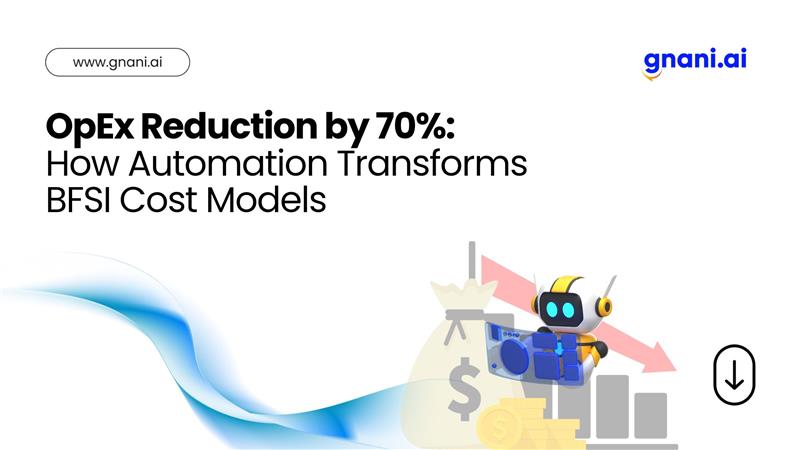In an industry where operational efficiency means profitability, BFSI has to bear the pressure for cost reduction without compromising on service quality continuously. The operational expenditure comprises a huge chunk of the budget in BFSI, and therefore, the dire need for scalable and efficient solutions has made Customer Experience Automation one of the most important strategies.
In fact, BFSI firms have reported the ability to achieve up to 70% OpEx reduction through automation of routine tasks and optimization of workflows. Cost structures are thus rewritten, enabling long-term sustainability.
The Importance of OpEx Optimization in BFSI
There are a number of persistent challenges with which BFSI organizations wrestle:
• The increasing cost of customer service needed for 24/7 operations.
• Inefficient handling of repetitive processes, like KYC, claims management, and loan applications.
• Scalability issues, such as surge demands during tax seasons or policy renewals.
Indeed, most of the traditional ways to achieve this scale-up, like increasing manpower or outsourcing services, come with their added expenses and complexities. CX Automation can, therefore, allow for a very transformational approach: to streamline operations, scale seamlessly, and cut overheads without affecting service quality.
How CX Automation Drives OpEx Reduction
1. Streamlining of Routine Processes
Automation helps BFSI companies handle high-volume routine activities, like customer inquiries, due date payment reminders, or account updates, while humans intervene less. While performing these kinds of continuous processes, the automation of tasks at firms gets rid of inefficiencies, decreases the number of errors, and speeds up the pace.
Impact on OpEx:
• Reduces dependence on large customer care teams.
• Minimizes manual intervention and reduces training costs during onboarding.
• Provides consistent service via every channel of communication.
2. Scalability Without Resource Constraints
CX Automation will, therefore, ensure that BFSI companies manage spikes in customer interactions—whether because of loan processing seasons or due to some unprecedented event in the market. In the case of automated systems, their capacity scales up with the rise in demand, hence there is no need to deploy more personnel or outsource processes.
Impact on OpEx:
• Eliminates the cost of temporary staff during seasonal demand.
• Operational flexibility without resource stress.
• Reduces downtime during high-demand periods, hence assuring continuity of service.
3. Multilingual Support Without Scaling Costs
Conventionally, offering multi-lingual support means that you either have to hire a team of trained resources, which is time-consuming and quite expensive. CX Automation delivers bots that can support multi-lingual engagement in no time with high accuracy while being able to maintain consistency and scalability for your business.
Impact on OpEx:
• It eliminates the need for an expansive multilingual team, cutting hiring and training costs.
• Provides high-quality multilingual service at scale.
• Ensures consistent, personalized communication for various diversified customer bases.
4. Accelerate Your ROI with Faster Deployments
With modern automation solutions, speedy deployment is very much in focus. Since BFSI firms need those solutions very badly, speed necessarily would therefore mean cost and operational benefits have to accrue to companies almost overnight. The level of agility thus assures that there will be rapid adaptation to market demand on the part of an enterprise without delays or inefficiencies.
Impact on OpEx:
• Rapid implementation helps minimize downtime and transition costs.
• Cost savings immediately due to efficiencies driven through automation.
• Shortened onboarding processes reduce hidden operational costs.
5. Empowering Employees for Strategic Impact
CX Automation allows employees to concentrate on high-value activities like customer relationship management and strategic decision-making by automating routine tasks. This will improve productivity and morale while reducing some of the costs associated with attrition.
Impact on OpEx:
• Boosts employee productivity by reducing mundane workloads.
• Improves job satisfaction, reducing turnover costs.
• Allocates human resources to those areas that directly benefit business growth.
CX Automation Transformation of BFSI Cost Models
BFSI organizations will increasingly have no choice but to adopt CX automation. This will yield leaner operations, a gain in efficiency, and costs. By investing in robust AI-driven automation, one can build a future-ready cost structure that optimally balances scale with service excellence.
Automation isn’t about cost reduction but operational resilience, ensuring the delivery of world-class customer experiences without stretching resources too thin. The leaders in the BFSI sector will unlock unparalleled growth opportunities and operational agility by embracing this transformation.


